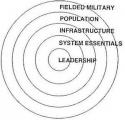One would hope that figuring out how to fund all of these non-negotiable requirements would be something that our financial community could come together on and put ahead of their own "needs"...
From Financial Crisis to Debt Crisis? by Kenneth Rogoff
As governments pile up war-level debt burdens, when will the problem explode? One again we just don’t know. Our theoretical models tell us that even a massively leveraged economy can plod along for years, if not decades, before crashing and burning. It all boils down to confidence. It is precisely when investors are most sure that governments will eventually dig their way out of huge debt holes that politicians dig their way deeper and deeper into debt. Economics theory tells us a lot about which countries are most vulnerable, but specifying exactly where and when crises will erupt is far more difficult.A Phantom Recovery? by Nouriel RoubiniWe are constantly reassured that governments will not default on their debts. In fact, governments all over the world default with startling regularity, either outright or through inflation. Even the US, for example, significantly inflated down its debt in the 1970’s, and debased the gold value of the dollar from $21 per ounce to $35 in the 1930’s.
Stimulate or Die by Joseph E. StiglitzA second reason to fear a double-dip recession concerns the fact that oil, energy, and food prices may be rising faster than economic fundamentals warrant, and could be driven higher by the wall of liquidity chasing assets, as well as by speculative demand. Last year, oil at $145 a barrel was a tipping point for the global economy, as it created a major income shock for the US, Europe, Japan, China, India, and other oil-importing economies. The global economy, barely rising from its knees, could not withstand the contractionary shock if similar speculative forces were to drive oil rapidly towards $100 a barrel.
Some worry about America’s increasing national debt. But if a new stimulus is well designed, with much of the money spent on assets, the fiscal position and future growth can actually be made stronger.
It is a mistake to look only at a country’s liabilities, and ignore its assets. Of course, that is an argument against badly designed bank bailouts, like the one in America, which has cost US taxpayer hundreds of billions of dollars, much of it never to be recovered. The national debt has increased, with no offsetting asset placed on the government’s balance sheet. But one should not confuse corporate welfare with a Keynesian stimulus.










Bookmarks